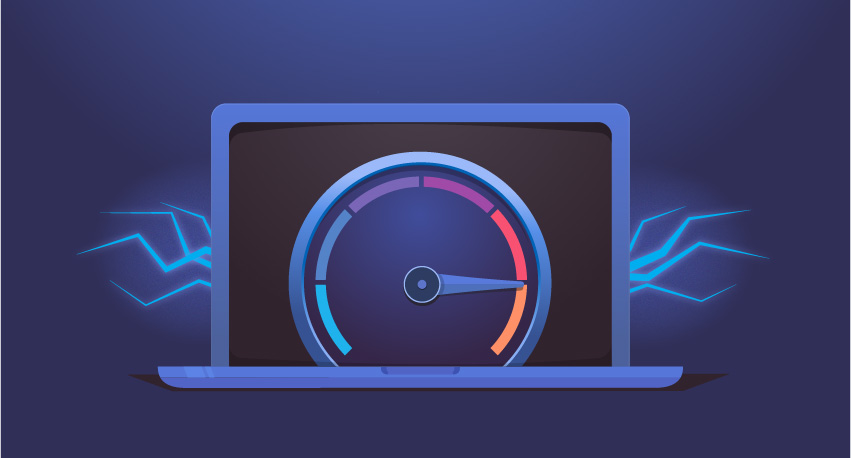Get the Right Internet Speed for Your Next Netflix Binge
Make movie night a breeze with speeds of at least 25Mbps
Oct 9, 2025 | Share
Internet Speed Guides
Netflix is pretty amazing, but there’s a big catch. You need internet speeds of at least 25Mbps to watch in high definition.
Our expert advice is a little different from the Netflix recommendation of 3Mbps for a single show, but let us explain. In the real world, most people watch Netflix while doing 10 other internet things simultaneously on their computers, phones, or tablets. And don’t forget all those smart devices and your kids or roommates watching in the next room!
To avoid the buffer gremlins for a single Netflix stream, get internet of 25Mbps or more. You’re even better off with 100Mbps if you want to watch on multiple screens at the same time. To enjoy video streaming in 4K resolution, consider upgrading to a plan with speeds of at least 200Mbps.
Does your Wi-Fi have what it takes?
Take our speed test to see if your internet is fast enough to support your Netflix habit.
Download speed
000 Mbps
Upload speed
000 Mbps
Latency (ping)
00 ms
Jitter
00 ms
Netflix speed basics
Before we jump into the nitty-gritty, here’s a quick breakdown of three things you need to know about Netflix and internet speeds.
Three golden rules for Netflix internet:
- The more users and devices logged in at once, the more internet speed you need.
- For 4K streaming, fiber or cable internet plans are best.
- For slow connections and hotspots, choose a Netflix Basic plan.
Here are your minimum speed needs for Netflix
Netflix claims on its website that you can stream with speeds as low as 3Mbps. But that’s only if Netflix is the only app you’re using while you’re online—not an accurate reflection of how most folks spend their time on the web these days.
The experts at HighSpeedInternet.com put together some realistic Netflix speed recommendations. You can easily get these speeds on pretty much any fiber, cable, 5G plan —or even some DSL and satellite internet plans.
| Netflix Plan | Minimum required speed* | Minimum recommended speed for optimal streaming | Sign up online |
|---|---|---|---|
| Standard with ads | 3Mbps | 25Mbps | Sign Up |
| Standard | 5Mbps | 100Mbps | Sign Up |
| Premium | 15Mbps | 200Mbps | Sign Up |
Recommendations from Netflix’s speed requirements page.
How Much Internet Speed Do You Need?
Est. Time: 60 seconds
Answer 6 questions and get a personalized internet speed recommendation!
How many people in your household use the internet/WiFi on a daily basis?
How many devices in your home connect to the internet, including tablets, gaming consoles, and smart devices?
How many people in your household work from home?
What video quality do you use for streaming TV and movies?
How intensely does your household participate in online gaming?
Does your household download large files from the cloud or via the internet?
Our experts say: Internet speed needs are the same for all video streaming apps
If you have enough internet speed to stream Netflix, that means you’ll have enough speed to switch over to other platforms such as Paramount+, Max, Apple TV, or YouTube TV. The only time you’ll need faster speeds is if you’re trying to stream on multiple screens at the same time.
What do you need to stream Ultra HD 4K movies on Netflix?
Many households need speeds of 200Mbps or faster to facilitate watching movies in Ultra HD 4K resolution on Netflix.
4K resolution gives you images in awe-inspiring detail, enhancing your experience for the sweeping cinematic grit of All Quiet on the Western Front or the lush splendor of a nature docuseries like Our Great National Parks. Nothing beats it, especially when you have a big screen.
The problem? 4K uses up a lot of broadband speed. Like, A LOT. Streaming in 4K also puts a massive dent in your monthly data allotment.
Here’s a breakdown of the scary stats:
- 4K requires speeds of at least 15Mbps minimum speeds for a single user to stream Netflix smoothly—3X faster than what you need to stream video in Full HD 1080p resolution.
- Watching a two-hour film in 4K consumes a whopping 16GB per hour—4X the data you would use streaming the same film HD.
Get fiber internet or a gigabit cable plan for the best 4K performance
You basically need supercharged internet to keep a 4K stream flowing without it getting bogged down by the spinning wheel of death. But you can bulk up your broadband speed with a fiber internet plan. Fiber gives you the fastest and most reliable type of internet connection, and even baseline plans get you super-smooth speeds.
If fiber internet hasn’t yet come to town, there’s a good chance you can get fast speeds from a cable internet provider. If you’re an ultra-high-def enthusiast, look for plans of about 1,000Mbps (1Gbps).
Best internet plans for 4K video streaming
| Plan | Price | Speed | Order online |
|---|---|---|---|
| AT&T Internet 300 | $55.00/mo.* | 300Mbps | |
| Verizon Fios 500 Mbps | $74.99/mo.† w/ Auto Pay | 500Mbps | View Plan |
| Google Fiber Core 1 Gig | $70.00/mo.‡ | 1,000Mbps | View Plan |
| Xfinity 1 Gig | $100.00/mo.§ for 12 mos. | 1,000Mbps | View Plan |
Read disclaimers.
Find fast internet for smooth streaming
Need a killer Wi-Fi plan to binge Better Call Saul? Run a search with your zip code to see which internet plans are available in your area.
What if you have slow internet? Never fear—you can still watch Netflix
You can pay a pretty penny for Netflix Premium and ultra-fast internet to go with it. Butdoes that mean the party is over for Netflix when you’re on a budget? Of course not.
If you’re on a budget, start by finding a budget internet plan (you’ll find some of our faves below). Then, pick a Netflix plan that doesn’t bust your wallet in half—we recommend Netflix Basic for its manageable 720p resolution.
If you want, you can lower your resolution even more. That’s something you may need to do if you’re streaming video over a hotspot. As convenient as mobile hotspots are, they come with strict internet data limits that can put a serious damper on your Netflix usage if you’re not careful. Watch a few too many movies in HD or 4K and you can use up $90 worth of data in a day.
Best internet plans for budget Netflix users
| Plan | Price | Speed | Order online |
|---|---|---|---|
| Astound 300Mbps Internet | $20.00/mo.* | 300Mbps | View Plans |
| Xfinity 500 Mbps | $55/mo.† for 12 mos. | 500Mbps | View Plans |
| T-Mobile Rely Internet | $50/mo.‡ w/ AutoPay, plus taxes & fees. | 133–415Mbps | View Plans |
| Verizon 5G Home | $50/mo.§ w/ AutoPay | Up to 300Mbps | View Plans |
Read disclaimers.
‡ Guarantee exclusions like taxes and fees apply.
§ Price per month with Auto Pay & without select 5G mobile plans. Consumer data usage is subject to the usage restrictions set forth in Verizon’s terms of service; visit: https://www.verizon.com/support/customer-agreement/ for more information about 5G Home and LTE Home Internet or https://www.verizon.com/about/terms-conditions/verizon-customer-agreement for Fios internet.
Can you stream Netflix with satellite internet?
Yes, you can definitely stream Netflix with satellite internet. But satellite has very slow speeds and (often) extremely limited data caps, so you’ll want to reduce your video resolution to the lowest-possible setting to get the most out of your Netflix experience. The image quality isn’t as nice, but low resolution keeps you from burning through a month’s worth of data in a matter of hours.
Pro tip—Get more streaming plan recommendations
Take a look at our guide to the best internet for streaming for a breakdown of top Wi-Fi plans to meet your Netflixing needs.
Here’s how to adjust the video resolution on your Netflix app
Netflix automatically chooses a video resolution based on your Netflix plan and connection speed. But you can change it manually ff your Netflix streaming falls prey to buffering and slow load times a bit too often. Lowering your video resolution will also help you reduce data usage, which is crucial if you’re worried about your data cap.
To reduce data usage and buffering, set the resolution to Medium or Low. Here’s how to do it:
On desktop:
Step 1: Sign in from your browser.
Step 2: Click your profile on the Who’s Watching? screen.
Step 3: Click Account in the drop-down menu that appears when you move your cursor over the Profile section in the top right-hand part of the screen.
Step 4: Select the profile you want to edit in Profile & Parental Controls.
Step 5: Go to Playback settings and click Change.
Step 6: Choose between Auto, Low, Medium, or High in the section titled Data usage per screen.
On mobile:
Step 1: Sign in from your browser app.
Step 2: Tap Menu on the upper left.
Step 3: Tap Account.
Step 4: Tap the profile you want to edit in Profile & Parental Controls.
Step 5: Tap Change in Playback settings.
Step 6: Choose between Auto, Low, Medium, or High in the section titled Data usage per screen, then tap Save.
Choose the best Netflix plan in an age of post-password sharing
As Netflix cracks down on password sharing—forcing customers to pay an extra $7.99 a month for any users outside a subscriber’s household—it’s important to decide which plan is best for you.
The Standard and Premium plans are best for most people because they offer higher resolution and give you more flexibility in the number of shows you can stream simultaneously.
If you have slow internet—through a DSL or satellite connection, for example—you should consider going a cheaper route with the Standard or Standard with Ads plans.
Netflix plan options
| Plan | Price | # of simultaneous streams | # of devices you can download shows on | Max video resolution | Sign up online |
|---|---|---|---|---|---|
| Standard with ads | $7.99/mo. | 0 | 1 | Full HD (1080p) | Sign Up |
| Standard | $17.99/mo. | 2 | 2 | Full HD (1080p) | Sign Up |
| Premium | $24.99/mo. | 6 | 6 | Ultra HD (4K) and HDR | Sign Up |
| Standard w/extra member slots | $24.98/mo.* | 2 + 1 | 2 + 1 | Full HD (1080p) | Sign Up |
| Premium w/extra member slots | $33.98/mo.† | 6 + 2 | 6 + 2 | Ultra HD (4K) and HDR | Sign Up |
FAQ
What upload speed is good for Netflix?
Disclaimers
Best internet plans for 4K Netflix streaming (return to table)
Data effective 07/07/2025. Offers and availability may vary by location and are subject to change.
*Price after $5/mo Autopay & Paperless bill discount (w/in 2 bills). Plus taxes & fees. Monthly State Cost Recovery Charge in TX, OH, NV applies. One time install chrg may apply. Ltd. avail/areas.
‡Plus taxes and fees. Upload/download speed and device streaming claims are based on maximum wired speeds. Actual Internet speeds are not guaranteed and may vary based on factors such as hardware and software limitations, latency, packet loss, etc.
† Consumer data usage is subject to the usage restrictions set forth in Verizon’s terms of service; visit: https://www.verizon.com/support/customer-agreement/ for more information about 5G Home and LTE Home Internet or https://www.verizon.com/about/terms-conditions/verizon-customer-agreement for Fios internet.
§ For 12 months, no term contract. Restrictions apply. Autopay w/ stored bank account and paperless billing req’d. Taxes and fees extra and subj. to change. Reduced speeds after 30 GB of usage/line. Data thresholds may vary.
Best internet plans for budget Netflix users (return to table)
Data effective 07/07/2025. Offers and availability may vary by location and are subject to change.
*24 Month Internet Pricing. No contract required. Equipment priced separately. Includes $5 discount for 12 months w/ ebill & autopay. Experienced speeds may vary. New residential customers only.
† For 12 months, no term contract. Restrictions apply. Autopay w/ stored bank account and paperless billing req’d. Taxes and fees extra and subj. to change. Reduced speeds after 30 GB of usage/line. Data thresholds may vary.
‡ Guarantee exclusions like taxes and fees apply.
§ Consumer data usage is subject to the usage restrictions set forth in Verizon’s terms of service; visit: https://www.verizon.com/support/customer-agreement/ for more information about 5G Home and LTE Home Internet or https://www.verizon.com/about/terms-conditions/verizon-customer-agreement for Fios internet.
Author - Peter Holslin
Peter Holslin has more than a decade of experience working as a writer and freelance journalist. He graduated with a BA in liberal arts and journalism from New York City’s The New School University in 2008 and went on to contribute to publications like Rolling Stone, VICE, BuzzFeed, and countless others. At HighSpeedInternet.com, he focuses on covering 5G, nerding out about frequency bands and virtual RAN, and producing reviews on emerging services like 5G home internet. He also writes about internet providers and packages, hotspots, VPNs, and Wi-Fi troubleshooting.




